22 May 2014 | Europe and Central Asia, News and features, Politics and Society, Ukraine
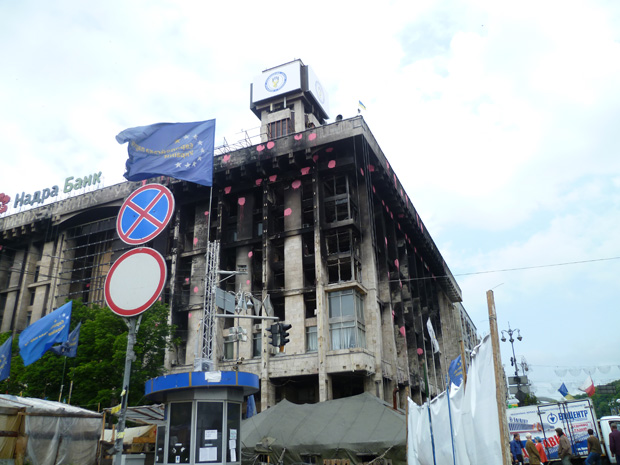
(Photo: Milana Knezevic/Index on Censorship)
Walking around Kiev’s Maidan Nezalezhnosti square, months after the protest that enveloped the city and toppled the corrupt government of Viktor Yanukovych died down, is a strange experience. International attention has understandably shifted, the images now beamed across the world are from the ongoing crisis in eastern Ukraine. The capital is calm these days, so I don’t know exactly what I was expecting as I made my way down Mykhailivska street.
Tents still populate Maidan, with young and old lounging, talking and cooking in the May sunlight. I walked past sandbag barricades, and ones made of tyres painted in the blue and yellow of the Ukrainian flag. There were flags were everywhere — EU, American, British, and many more. I walked past the independence monument, juxtaposed against the new year tree, covered by protesters in posters, and yet more flags. Music was blaring out from the small stage facing these towering structures. The lyrics I couldn’t understand, apart from the cry of “Ukraina” in the chorus. I made my way past the Maidan press centre, towards a bridge which had a large banner emblazoned with names and faces hanging from it. The Hotel Ukraina behind me, I looked out over the square.
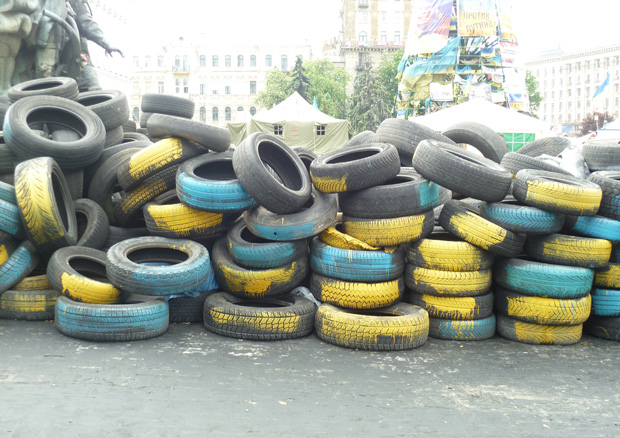
(Photo: Milana Knezevic/Index on Censorship)
The only thing missing was the crowds. It felt like they had just taken a break — gone for lunch, to return at any moment. Perhaps I arrived with a naive “out of sight, out of mind”, mentality, subconsciously assuming that the square would to an extent have been cleared out. But Maidan seems to be, for now at least, a living monument to the profound change, and crisis, Ukraine is going through.
It was against this backdrop, and with the country’s general elections set for this Sunday, I travelled to Kiev to take part in the conference Ukraine: Thinking Together. The brainchild of Yale University history professor Timothy Snyder and the New Republic’s Leon Wieseltier, its purpose was “to meet Ukrainian counterparts, demonstrate solidarity, and carry out a public discussion about the meaning of Ukrainian pluralism for the future of Europe, Russia, and the world.” The guest list included academics like Bernard-Henri, Lévy Timothy Garton Ash and Ivan Krastev, and journalists like The New York Times’ Roger Cohen and The Atlantic’s David Frum. Former Swedish prime minister Carl Bildt also made an appearance at the welcome reception.
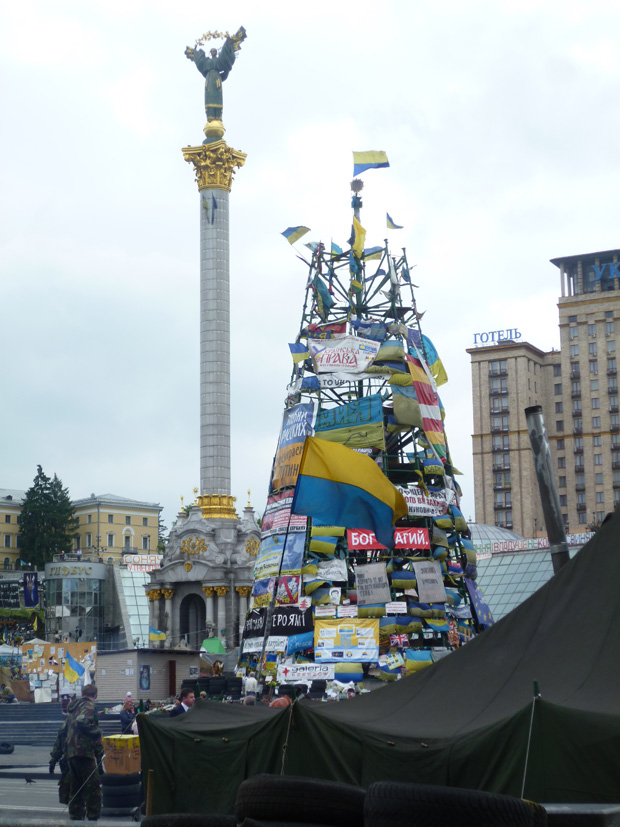
(Photo: Milana Knezevic/Index on Censorship)
One could question what, if any, effect the discussions of a group of intellectuals might have on the very real crisis on the ground. Over the weekend, there were among other things, a Crimean Tartar journalist was detained in Simferopol, while the Ukrainian military arrested two Russian reporters. But Kiev-based journalist Maxim Eristavi told me, and tweeted, that it was “surreal” to have the “intellectual powerhouse of the West in one room in Kyiv”. If nothing else, organising a big-name gathering to talk about Ukraine, in Ukraine, makes a bold statement — and one likely to be heard all the way to Moscow.
A range of topics were tackled in five days of panel debates and public lectures. The Maidan protest was applauded, with Wieseltier in his opening remarks calling it “one of the primary sites of the modern struggle for democracy”. Carl Gershman, President of the National Endowment for Democracy, called Maidan a geopolitical move, but by a people rather than a government.
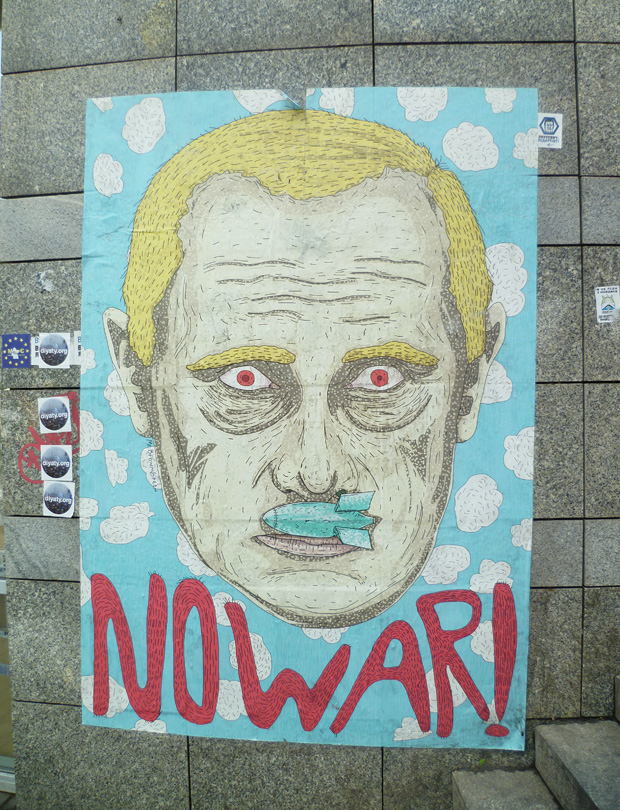
(Image: Milana Knezevic/Index on Censorship)
Bernard-Henri Lévy spoke of his recent visits to eastern Ukraine, explaining that while they might be fewer than in the Maidan, there are people in these areas who support a unified Ukraine. He contested what he believed to be the image presented in western media that people in the east are all separatists. While the point was made that flags, national symbols and the Maidan movement is not perceived as positively in all parts of the country as in Kiev, Constantin Sigov, professor at the National University of Kyiv-Mohyla, argued that the Ukrainian crisis is first and foremost civil and political, not one of identity.
Russia’s foreign policy and Russian President Vladimir Putin were unsurprisingly recurring themes. “He has values. They are not our values, but they are values,” said François Heisbourg, chairman of the International Institute for Strategic Studies, talking on the panel of geopolitics after Crimea. Writer Paul Berman argued, in the same panel, that Putin is acting from a position of weakness, and fear that Russia is not stable. Others, meanwhile, were uncomfortable with the term geopolitics, saying it legitimises Putin’s world view.
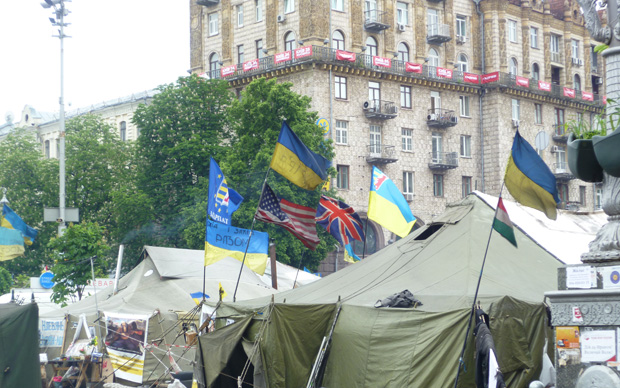
(Photo: Milana Knezevic/Index on Censorship)
Russia’s propaganda strategy was also a hot topic and elicited strong responses, with one audience member referring to it as a weapon of mass destruction. “Propaganda is the beginning of bloodshed, it precedes bloodshed,” said Alexandr Podrabinek, editor-in-chief of Prima information agency, on the panel discussing whether rights make us human. State-run news channel RT, formerly Russia Today, got several mentions. Academic Anton Shekhovtsov argued that RT gives space to democratic consensus in its coverage, but also to left-wing, far right and libertarian narratives, and even conspiracy theories. Because each is treated in roughly the same way, the democratic narrative becomes just one of many. He said this explains why RT appeals to some people in the west, but stressed that they’re pushing an overall Russian agenda.
Podrabinek, despite dubbing RT “hateful”, argued that while there might be a temptation to shut down views we don’t like, this is not a good way of confronting them. If we want freedom of expression, he said, we can’t do that. On a related note, Carl Gersham argued that while Ukraine needs to be supported economically and militarily, they also need support in modernising the media landscape, to foster internal dialogue.
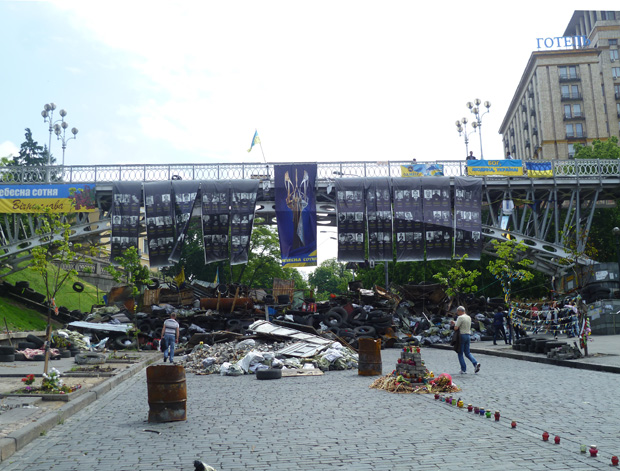
(Photo: Milana Knezevic/Index on Censorship)
And while the regime was criticised by speaker after speaker, ordinary Russians and their rights were not forgotten. Sergei Lukashevsky, director of the Sakharov Museum and Public Centre, put the support for Putin into the context of fear. When people see that the state is cracking down on human rights again, he argued, they make themselves fit in — go into survival-mode. While rights exist formally in Russia, he explained the practical situation through an old Soviet joke: “Do I have the right? Yes. Can I? No.”
In a weekend of intellectuals discussing how to solve a crisis, novelist and non-fiction writer Slavenka Drakulic gave a sobering lecture on the role of intellectuals in causing crises, specifically the Balkan wars. To be able wage war, to kill, you have to create an enemy and dehumanise it, she argued. Here is where academics, poets, journalists came in handy in former Yugoslavia — by preparing people psychologically for conflict, “using words almost like bullets”.
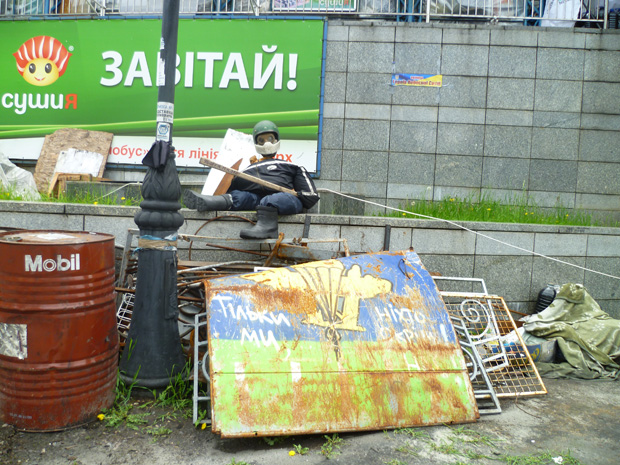
(Photo: Milana Knezevic/Index on Censorship)
And this leads well into the final panel of the conference, on the role of history and memory in politics, the difference between official history and collective and personal memories of the people, and how especially the former can be manipulated. We’re arguably seeing that today already, with Timothy Snyder saying that with events in Ukraine, a European revolution is being contested even as it’s happening. The Russian Ministry of Education is already writing new chapter to explain Crimea, said acclaimed Ukrainian novelist Andrey Kurkov. “And Ukraine might have their version.”
After my trip to Maidan, I asked a Ukraine-based AP journalist what the future might bring for the square. There are only a specific type of people still there, she explained, and they might see how the elections go before they decide to stay or leave.
Or as Myroslav Marynovych, the founder of Amnesty International Ukraine, said during the conference — when there is democracy, there will be no need to go to Maidan.
This article was published on May 22, 2014 at indexoncensorship.org
22 May 2014 | Counterpoint, Digital Freedom, News and features, United States

Graham Ginsberg shows how he feels about his search engine profile. (Photo courtesy Graham Ginsberg)
The internet is so much more significant than a newspaper article. It’s bigger than print in its longevity and reach and it’s forever growing, shaping the public lives for all generations, past, present and future.
The handling of this information has become exponentially important. The quote “With great power comes great responsibility” comes to mind. But where is the responsibility when it comes to showing our personalities, our castle, in search engines?
When search engines choose to show information about me, as an example, do they show all available information about me or do they choose certain articles and pictures they consider most relevant and fresh to show the public? And why is there no redress available to me to deal with how search engines portray me?
I recently submitted a complaint to three major search engines requesting that they remove certain pictures and references to articles about me that were old and irrelevant.
Google didn’t respond back, but Bing’s Technical Support did saying, “Thank you for contacting Bing Technical Support regarding your request to remove content from the Bing search engine. Working directly with the site owner or webmaster for removal of the content is the best way to resolve your issue. Bing doesn’t control the operation or design of the websites we index. We also don’t control what these websites publish. As long as the website continues to make the information available on the web, the information will be generally available to others through Bing or other search services.”
But this isn’t entirely true on several levels. But it’s their boilerplate response back, kind of a “it’s not our fault” statement.
Search engines like Bing, Google and Yahoo, do limit and restrict information they show in search results by using software that prioritizes and sorts data into a format it deems suitable.
What is censorship?
Censorship is the act or censoring, the removal or suppression of what is considered morally, politically, or otherwise objectionable. And this is precisely what search engines do right now in their own way using customised algorithms.
Bing suggested that I contact the webmaster in the hope that they would remove the information from being indexed on the internet. Bing suggests that they remove a story as if it never existed. But that isn’t my gripe. I have no problem that our local daily newspaper has pictures and an article about me protesting in front of their establishment. They have every right to have it and I don’t want it removed from their website.
But I have an issue with Bing for showing the information as if it was the only information there was on me. And there is a ton of information about me; from articles I had written to the local paper on a whole bunch of different subjects from national beach access issues to real estate, but little if any is shown in the search results. Just me standing in front of the paper protesting with a noose around my neck, almost ten years ago. Maybe the algorithms looks for keywords like ‘noose’ and prioritizes them higher than say and article about NBA Hall of Famer Larry Bird and his house, which I contributed last year in the same paper.
Because search engines are moneymaking machines, any customized filtering of search results will cost them dearly. And why not, they’re businesses like any other and should be held accountable for their product they’re selling. But what makes search engines different from any other business is they’re so big and powerful and that is why governments need to have means to force them into compliance.
It’s the Wild West all over again. Asking search engines like Google and Bing to police themselves, to be fair and moral has proven to be futile and why should they care or even act accordingly?
To keep the peace for the common good, laws need to have teeth to force offending search engines to comply with logical guidelines that protect the interests of the public and not just interests of these large search engine corporations.
This article was posted on 22 May 2014 at indexoncensorship.org
22 May 2014 | Czech Republic
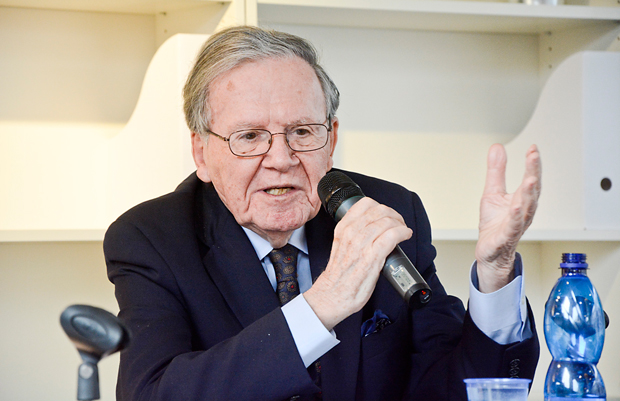
Peter Demetz (Photo: Prague Book Fair)
Emeritus Yale University professor and author Peter Demetz was awarded the Jiri (George) Theiner prize at the Prague Literary Festival this year.
George’s son Pavel, the prize organiser, said Demetz received the award because “all his life he has remained intellectually honest in his demystification of views which sometimes became popular such as the notion of magical Prague, rather stressing the reality of Czech history, as well as his life-long commitment to Czech literature in American and German environments and as translator of Frantisek Halas´ and Jiri Orten´s poetry”.
Theiner set up the prize in memory of his father’s work, as a former editor of Index on Censorship magazine he brought attention to Czech writing and writers during the communist era. He said: “Almost five years ago I discussed with the director of World of Books (Prague Book Fair), Dana Kalinova, the possibility of making this prize an important permanent fixture at the annual book fair. Looking back I realised that George Theiner´s reputation here was as solid as it was in other countries, despite the fact that he left in 1968.
The jury this year was chaired by Lenka Jungmannova (professor at the Institute of Czech Literature, Academy of Sciences), Martin Putna (literary historian, professor at Prague´s Charles University and critic), Jiri Gruntorad (guardian of the largest samizdat collection in central and eastern Europe, dissident persecuted in the 1970´s and 1980´s) and Ivan Biel (documentary film-maker and lecturer in Film Studies). Next year’s jury was also announced and will include Karel Schwarzenberg (a former Czech foreign minister, one of Havel´s closest aides and supporter of dissidents before 1989 whilst living in Austria), Michal Priban (academic at the Institute of Czech Literature, Academy of Sciences), Vladimír Pistorius (samizdat publisher who successfully made the transition into becoming a ´straight´ book publisher) and Jan Bednar (radio journalist and commentator, signatory of Charter 77, between 1985 and 1992 and who worked for the BBC in London).
Theiner said that they received between 35 and 60 nominations each year from all over the world. The criteria stated that the recipient (or organisation) had made a major long-term contribution to the promotion of Czech literature overseas, with an expectation that they have also made a contribution to freedom of speech and human rights in general. Other prize winners include Andrzej Jagodzinski, translator of Havel, Hrabal, Kundera, journalist as well as a leading member of the democratic opposition on Poland); Ruth Bondy (an Israeli of Czech origin, survivor of Auschwitz and Bergen-Belsen who worked as a journalist on the Hebrew daily Davar; and Paul Wilson (a Canadian who lived in Czechoslovakia as a young man before being thrown out in 1977 for collaborating with dissidents and, above all, the band Plastic Pepople of the Universe, translator of Skvorecky, Klima, Havel, Hrabal, radio producer, editor and writer).
Theiner said: “One of the most positive aspects that has come out of the activity surrounding the prize has been the link made between old and new Index on Censorship. It was a real joy to welcome to Prague at the first prize-giving the founding editor Michael Scammell along with some of his old colleagues such as Philip Spender, Haifaa Khalafallah and others. Four years later the present editor Rachael Jolley joined us and moderated a discussion following the award-giving ceremony on freedom after the fall of the Berlin Wall, a reflection on the democratisation of society and freedom of expression in literature and journalism. It´s great to see that the bridge-building that George Theiner was so adept at is still going strong.”
This article was published on May 22, 2014 at indexoncensorship.org
22 May 2014 | Academic Freedom, News and features, Religion and Culture, United Kingdom
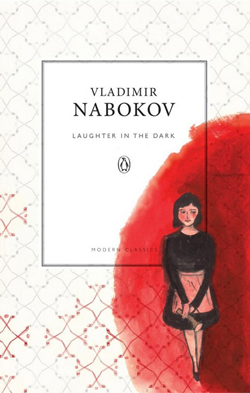
“Once upon a time there lived in Berlin, Germany, a man called Albinus. He was rich, respectable, happy; one day he abandoned his wife for the sake of a youthful mistress; he loved; was not loved; and his life ended in disaster.”
So begins Vladimir Nabokov’s Laughter In The Dark, a terse, tragic little book. There’s really not much more I can tell you about it, apart from the fact that the “youthful” mistress is uncomfortably so, Albinus says and thinks some quite sexist things about women, and he ends up disabled (and worse).
Perhaps then, in light of recent requests from English Lit students on American campuses that teachers should provide “trigger warnings” for novels that could contain traumatising themes and scenes, this already revealing opening could be rewritten:
“Once upon a time there lived in Berlin, Germany, a man called Albinus. He was rich, respectable, happy; one day he abandoned his wife for the sake of a youthful mistress; he loved; was not loved; and his life ended in disaster. TRIGGER WARNING: sexism, cis-sexism, borderline paedophilia, violence, ableism.”
Would that be so bad? Clumsy, no doubt, but does it really affect the reader’s experience, or, specifically, the academic learner’s ability to analyse the book? Well, yes, in that it skews one’s expectations, forces one immediately to think “this is a book about misogyny, violence, and disability,” rather than a book about say, the upheaval of interwar Europe, the clash of old and new, or just good old hubris: things Laughter In The Dark are actually about, rather than things that happen in Laughter in the Dark.
The trigger warning has its origins in online forums dedicated to specific topics, and in the backlash against the idea that has happened this week, some commentators have pointed out that this is an imposition by one small community on general society: Jonah Goldberg in the LA Times, for example, unfavourably compared those calling for trigger warnings on campus to Amish people, pointing out that the Amish would prefer not to have to deal with a lot of the modern world, but at least they don’t inflict their desires on other people.
It’s a tempting “who do these people think they are” argument, made all the more so enticing by the intergenerational aspect – pretty much every person I know over the age of 30 finds the “social justice” movement, from which ideas such as trigger warning have sprung from, equal parts infuriating and baffling. It feels like a world of endless taboos and astonishing sincerity, far removed from the heavy irony that, for better or worse, characterised the generation that preceded it.
And they don’t like us much either: writing for Vice last week, Theis Duelund denounced Generation Xers, born between 1965 and 1980, as “slackers [who] nihilistically accept the machine of which they are a part, and can dissect its fundamental facile and evil nature with all the clarity and urgency of a nineteenth-century Romantic poet.”
(If Theis wants to play that game, I’m creeped out by a generation of people for whom dressing up as something out of My Little Pony seems an acceptable subculture for an adult to be involved in).
But changes rarely come from spontaneous mass movements; more often than not, they come from persistent nagging from a minority (or “campaigning” as it’s more kindly called), who eventually convince the rest of us. So to complain that things such as trigger warnings are being foisted upon us by a small group of millennial social justice activists is to avoid the argument about generalised trigger warnings for literature themselves.
The argument being this. Art is an expression of the human condition; our urge to create art, and to consume art, is in large part driven by our need, as social animals, to communicate, to empathise and sympathise.
What that does not mean, however, is that a work of art should, or will, provoke a specific response. Alain De Botton, the writer of philosophically styled self-help books, has recently suggested, through an exhibition he has curated at the Rijksmuseum, that we can use art for self-improvement, implying that specific works inspire specific emotions. It’s a silly, reductive, anti-human argument, implying that there is a correct way to view art, and a correct single message to be taken from it.
Much of the discussion around trigger warnings, and indeed broader discussion of the modern “social justice” movement, is similarly anti-nuance. In the eyes of the online social justice activist, questioning is tantamount to discrimination. This, I believe, is partly generational – asking someone to explain something seems strange to generation just-fucking-Google-it, but as I’ve said, we shouldn’t make age the issue here.
The worry is that in an effort to protect individuals, we risk destroying empathy. The social justice term “allies” has replaced the old fashioned idea of “comrades”. You can support people’s struggle from a distance, “ally” suggests, but you cannot stand with them, because you do not understand the entirety of their experience. It implies a lack of faith in human imagination, in our ability to think outside of ourselves, and in the complexity of the human condition.
So it goes with the trigger warning: there seems little belief here in the idea that a work of fiction could tell us something bigger about the world, could help us understand our fellow beings; or even that reading about experiences that mirror your own may actually help, may make you realise that you are part of something universal. Blood-and-guts fantasy fiction such as Game of Thrones seems to escape opprobrium, perhaps exactly because it’s not seen as being anything to do with the bad things that happen in the real world.
The message and tone of the “trigger warning” suggests a sad lack of faith in the power of art, and, by extension, humanity. We’re capable of better.
This article was posted on May 22, 2014 at indexoncensorship.org










